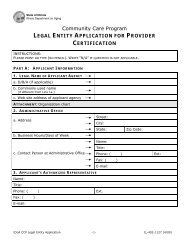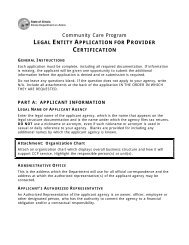Illinois Living Will Act DECLARATION - State of Illinois
Illinois Living Will Act DECLARATION - State of Illinois
Illinois Living Will Act DECLARATION - State of Illinois
You also want an ePaper? Increase the reach of your titles
YUMPU automatically turns print PDFs into web optimized ePapers that Google loves.
What is a <strong>Living</strong> <strong>Will</strong>? A <strong>Living</strong> <strong>Will</strong> is a document in which a person can declare his or her desire tohave death-delaying procedures withheld or withdrawn in the event he or she has been diagnosed witha terminal condition by a physician. (Specific definitions are provided for these legal terms in the <strong>Illinois</strong><strong>Living</strong> <strong>Will</strong> <strong>Act</strong>).What are the advantages <strong>of</strong> a <strong>Living</strong> <strong>Will</strong>? A <strong>Living</strong> <strong>Will</strong> assures that your rights will be respected ifyou are not able to actively participate in death-delaying decisions relating to your own health care dueto a physical or mental condition. Additionally, a <strong>Living</strong> <strong>Will</strong> saves your family from the burden <strong>of</strong> havingto make health care decisions about consenting to or refusing death-delaying procedures without knowingyour wishes.Who may execute a <strong>Living</strong> <strong>Will</strong>? Any person age 18 or older who is a resident <strong>of</strong> <strong>Illinois</strong> may executea <strong>Living</strong> <strong>Will</strong> at any time. The <strong>Living</strong> <strong>Will</strong> document (see reverse side) must be signed by you and two (2)independent witnesses.Must an attorney prepare the <strong>Living</strong> <strong>Will</strong> document for you? Although <strong>Illinois</strong> law does not requirethat an attorney prepare a <strong>Living</strong> <strong>Will</strong> document, you may want to consult with an attorney for additionalguidance in protecting your interests using advance directives.When should you execute a <strong>Living</strong> <strong>Will</strong>? The best time for you to execute a <strong>Living</strong> <strong>Will</strong> is right now,long before you anticipate anything happening to you. This will ensure that the attending physician andyour family know your wishes if you are ever in a situation where death-delaying procedures becomenecessary.When does a <strong>Living</strong> <strong>Will</strong> take effect? Under <strong>Illinois</strong> law, a properly signed and witnessed <strong>Living</strong> <strong>Will</strong>takes effect once a person has been diagnosed with a terminal condition and his or her attendingphysician verifies such information in writing as a part <strong>of</strong> the medical record.If the attending physician is unwilling to comply with the instructions stated in a <strong>Living</strong> <strong>Will</strong> document,then the physician must notify his or her patient <strong>of</strong> that fact. If the patient is unable to initiate a transfer<strong>of</strong> his or her care to another physician, then the physician is required by law to notify: (1) any personauthorized by the patient to make such arrangements, (2) the patient’s guardian, or (3) any member <strong>of</strong>the patient’s family.HOWEVER, a <strong>Living</strong> <strong>Will</strong> shall not be given effect so long as an agent is available who is authorized todeal with death-delaying decisions on your behalf under a Durable Power <strong>of</strong> Attorney for Health Care.How can a <strong>Living</strong> <strong>Will</strong> be revoked? You may revoke your <strong>Living</strong> <strong>Will</strong> by (1) burning, tearing, orotherwise destroying or defacing the document, (2) signing a written revocation, or (3) making an oralrevocation in the presence <strong>of</strong> a witness 18 years <strong>of</strong> age or older who then puts the revocation in writingfor you.<strong>Will</strong> your <strong>Living</strong> <strong>Will</strong> be recognized in another state? The answer depends on the laws <strong>of</strong> eachstate. Although most states will recognize a <strong>Living</strong> <strong>Will</strong>, some require a document to be both witnessedand notarized to be valid. After you execute a <strong>Living</strong> <strong>Will</strong>, you may want to sign this document in thepresence <strong>of</strong> your witnesses and a notary public to avoid any possible problems.HOWEVER, a <strong>Living</strong> <strong>Will</strong> document which has been executed in compliance with the law <strong>of</strong> another statewill be recognized in <strong>Illinois</strong>.Other things to consider:(1) You should talk to your physician about your <strong>Living</strong> <strong>Will</strong> to be sure that he or she will comply withyour instructions about withholding or withdrawing death-delaying procedures.(2) You should give the original <strong>Living</strong> <strong>Will</strong> document upon its completion (signed, witnessed, andnotarized) to your physician, and provide copies to your health care facility, hospital, lawyer,agent under a Durable Power <strong>of</strong> Attorney for Health Care, family, or other individuals whom youcan rely on to act according to your interests and values.(3) You may want to make a note about your <strong>Living</strong> <strong>Will</strong> on the reverse side <strong>of</strong> your driver’s licenseor add a notification card to your wallet.
















